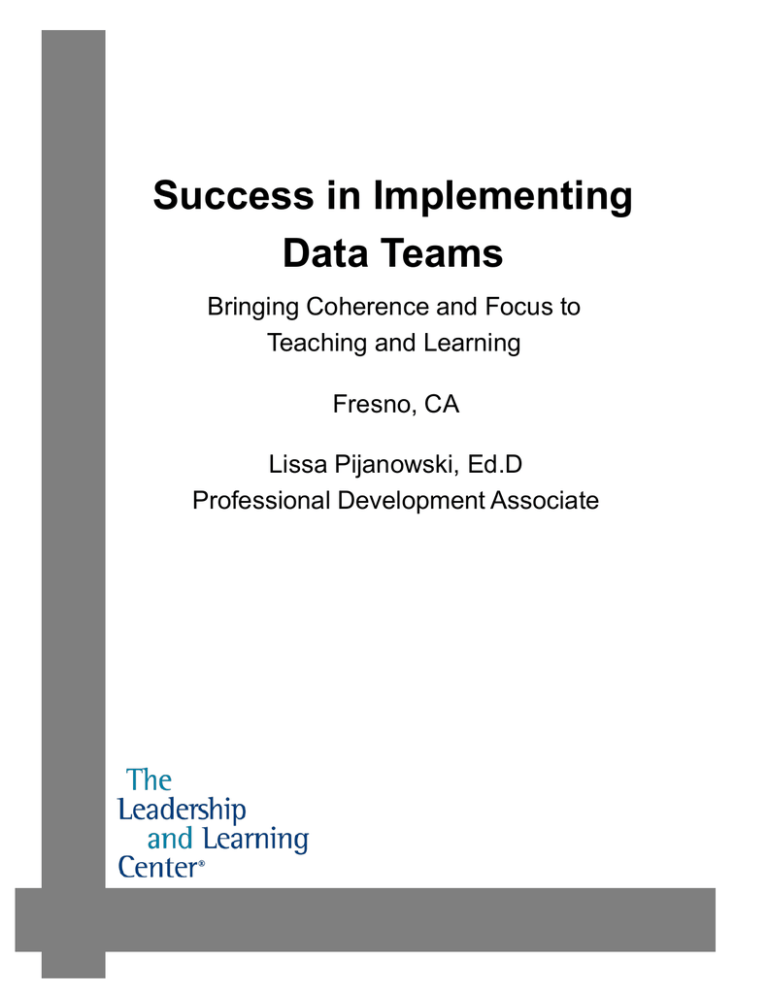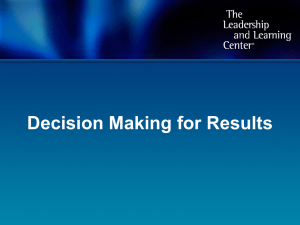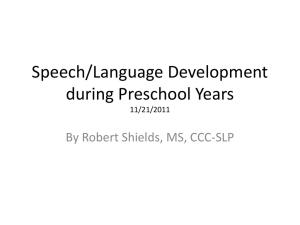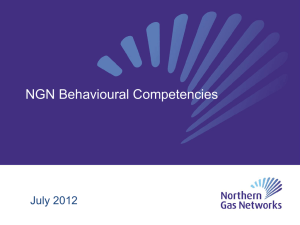
Success in Implementing
Data Teams
Bringing Coherence and Focus to
Teaching and Learning
Fresno, CA
Lissa Pijanowski, Ed.D
Professional Development Associate
Focus
The right kind of continuous, structured teacher collaboration improves the
quality of teaching and pays big, often immediate, dividends in student learning
and professional morale in virtually any setting. Our experience with schools
across the nation bears this out unequivocally.
~ Mike Schmoker, 2006
Focus
Identify the “Top Ten” instructional priorities for your
school or department or district for the coming year:
Please circle your “Top Three”
In order to implement successfully your highest priorities, what are two specific
changes you can make now - for the current school year - to improve your
opportunities for success?
© 2012 The Leadership and Learning Center
All rights reserved. Copy only with permission.
www.LeadandLearn.com
Levels of Data Analysis – Self Assessment
Please underline or circle words or phrases that particularly resonate with you:
Level 1 - Data Averse - “The use of data is unfair and evaluative. If we look at data at the
student level, we violate their privacy. If we look at data at the teacher level, we violate their
professionalism. Worst of all, if we emphasize student data, we encourage poor teaching and
cheating. Whatever benefits there may be, the risks are greater and data analysis is just not
worth the effort.”
Level 2 - Data Aware - “I’m willing to look at the data - perhaps at the school and district
level. Sometimes it is interesting to see how students performed and how schools are
different. But I can’t say that data analysis influences teaching and leadership. We certainly
do not measure teaching and leadership - in fact, I’m not sure that measuring those qualities
is even possible.”
Level 3 - Data Application - “We look at a variety of sources of student data, including state,
local, school, and classroom-based assessments. We also look at teaching and leadership
strategies, such as the time we allocate to various subjects and the frequency of feedback we
provide to students. We regularly compare causes - teaching and leadership - with effects student performance, and we have evidence that we adjust practices accordingly.”
Level 4 - Data Master - “We regularly use data to challenge our assumptions about teaching,
leadership, and learning. We can think of specific changes we’ve made and mistakes we’ve
made, and we can also think of specific instances in which we have affirmed our best
practices, even if they were not very popular. Most importantly, we can identify how we have
used our best practices to assist our colleagues in other schools and other systems. We use
data not just to be more professional, but to improve the world of education.”
Level 5 - Data Inspiration - “Our students use data to provide self-assessment and
immediate feedback and we have specific, compelling, and inspirational examples in which
students challenge themselves to ever-higher levels of performance far beyond what
traditional standards and testing would have accomplished.”
Identify specific words or phrases that contrast your present and future use of data:
Present Use of Data:
© 2012 The Leadership and Learning Center
All rights reserved. Copy only with permission.
www.LeadandLearn.com
Future Use of Data:
Weed the Garden!
Consider the two essential
questions of the
implementation audit: Are
we really using it? And is
there strong evidence that
it is directly related to
improving student
performance?
Consider the professional
learning initiatives in place
in your school system,
assessing the degree of
implementation and the
impact on student
achievement.
Write the names of your initiatives in the appropriate quadrants of the following
matrix.
Lead
Invest
Weed
Evaluate
What implications does the matrix have for successful implementation of the
Common Core State Standards?
© 2012 The Leadership and Learning Center
All rights reserved. Copy only with permission.
www.LeadandLearn.com
The Data Team Process
Step 6:
______________
and
______________
Step 1:
______________ and
______________ data.
Step 5:
Step 2:
_________________
results indicators.
______________ data
and ________________
needs.
Step 4:
_________________
common
instructional
strategies.
© 2012 The Leadership and Learning Center
All rights reserved. Copy only with permission.
www.LeadandLearn.com
Step 3:
____________, ___________,
and ______________
incremental SMART
goals.
Framework for Implementation
Leadership
• Learn the Data Teams Process
• Develop and Communicate the BIG Picture
• Monitor the Process
Structure
• Select and Train Data Team Leaders
• Form Data Teams
• Define Roles and Responsibilities
Organization
• Schedule Data Team Meetings
• Create an Assessment / Pacing Calendar
• Display Results
Communication
• Results
• Process
• Celebrate Results
What are the considerations for Data Teams implementation in my school or
district? How can we connect the dots for our teachers?
© 2012 The Leadership and Learning Center
All rights reserved. Copy only with permission.
www.LeadandLearn.com
Data Team Roles and Responsibilities
Select Data Team Leaders
Who are the potential Data Team Leaders?
Criteria
Candidates
Understands standards and
assessment
Understands Decision Making for
Results process
Understands research-based strategies
Understands facilitation skills and
strategies
Data Team Roles
Data Technician
Gathers data from all
team members
Creates
tables/charts/graphs
that represent
assessment results
Communicates results
to appropriate
stakeholders
Data Wall Curator
Timekeeper
Makes sure team
follows pre-determined
time frames
Keeps team members
informed of available
time per step
Posts incremental
assessment data
Manages the creation
of a narrative (cause
information) that
accompanies the
numbers (effect)
Recorder
Focus Monitor
Keeps dialogue
focused on step in the
process
Reminds team of
purpose when
necessary
Engaged Participant
© 2012 The Leadership and Learning Center
All rights reserved. Copy only with permission.
www.LeadandLearn.com
Takes minutes of the
meeting using
standard templates
Distributes minutes to
team members and
appropriate
stakeholders
Responsibility of all
team members
Contributes to dialogue
Commits to decisions
of team
Respectfully poses
questions
Uses active listening
Assessment/Meeting Calendar
Create an Assessment / Meeting Calendar
Map out State/National Summative
Assessments
Add school/district Benchmark dates
Indicate Common Formative Assessment
Dates
August
Highlight Data Team Meeting dates to support
all five steps of the process
September
October
November
December
January
February
March
April
May
© 2012 The Leadership and Learning Center
All rights reserved. Copy only with permission.
www.LeadandLearn.com
Action Plan
Data Teams Implementation Action Plan
Our Strategy
Date to be
completed
Communicate
Expectations
Form Data Teams
Appoint Data
Team Leader
Schedule Data
Team Leader /
Administrator
Meetings
Create
Assessment /
Meeting Calendar
Create a system
for posting Data
Team charts and
graphs
Create Internal
Communication
System
Create External
Communication
Systems
© 2012 The Leadership and Learning Center
All rights reserved. Copy only with permission.
www.LeadandLearn.com
Person(s)
Responsible
Desired
Outcome
Implementation and Monitoring
Considerations for Monitoring Data Teams:
Who will monitor the Data Team? How often?
How will we monitor instruction?
How will feedback be given to the Data Teams?
Notes / Thoughts / Ideas for Implementation:
© 2012 The Leadership and Learning Center
All rights reserved. Copy only with permission.
www.LeadandLearn.com
Reflect
Three Points to Remember:
1)
2)
3)
Email Lissa: lpijanowski@leadandlearn.com
Visit Lissa’s website: www.lissapijanowski.com
Call Lissa: 1.866.399.6019 ext. 521
Follow Lissa on Twitter: @lpijanowski
Like Lissa on Facebook: www.facebook.com/lpijanowski
The Leadership and Learning Center
Visit Our Website: www.leadandlearn.com
Email Us: info@leadandlearn.com
Call Toll-Free: 1.866.399.6019
International: +1.303.504.9312
© 2012 The Leadership and Learning Center
All rights reserved. Copy only with permission.
www.LeadandLearn.com









